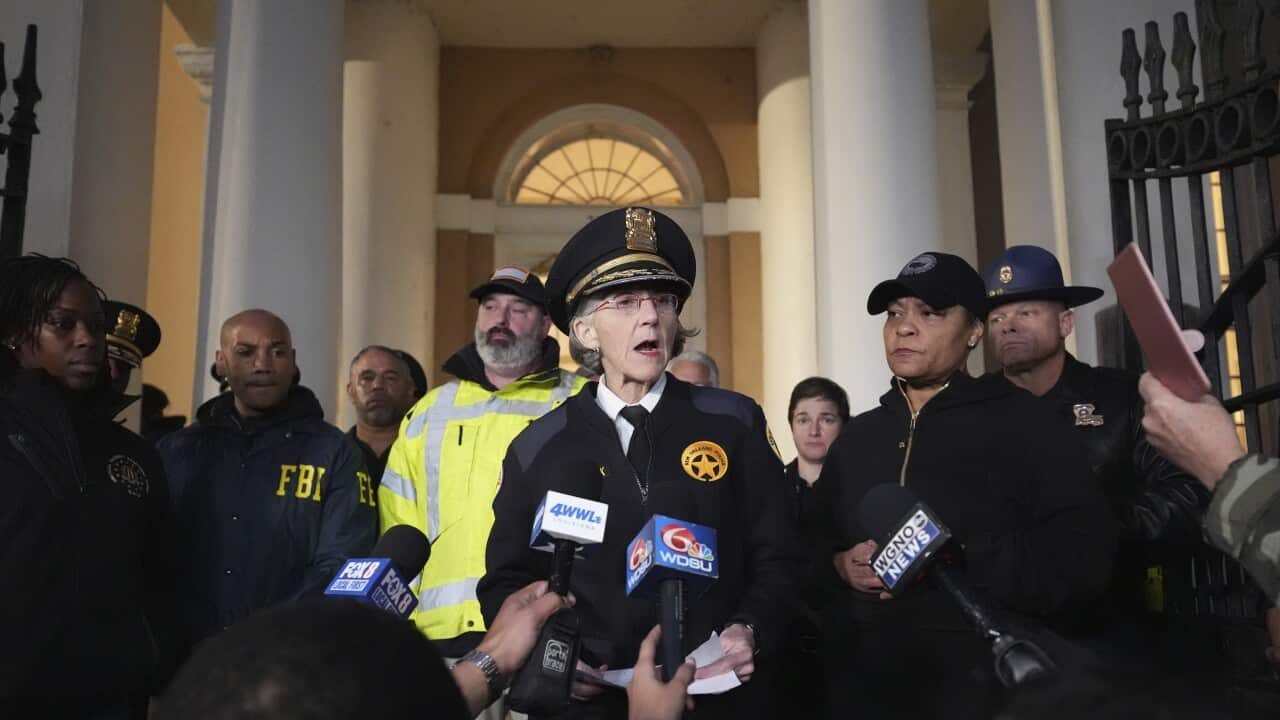English
During the COVID-19 pandemic, many businesses stopped accepting cash as part of the effort to stop the spread of the virus.
However, the use of cash has been declining gradually across the economy since well before 2019, with digital payments and card transactions gaining popularity over the past decade.
With ATM's across the country disappearing and bank branches closing, many are left wondering if Australia is headed into a cashless future.
One local business owner in Sydney, Sanjiv, says he's worried declining cash could affect his business.
"No, actually, they definitely are going to struggle, because you know they hardly have much knowledge about those machines and they definitely need help. Somebody has to be with them to spend the money, if it's cash they can figure it out how to spend the money, but with the card, they're not sure whether they can use it or not in the store. And with the cardless, you know the business is also struggling without cash because recently in the Easter Long Weekend, we need some coins and cash, the banks are all closed and it's hard to find. It's hard to find branches around this area."
Sanjiv opened his Nepalese grocer earlier this year and says having cash as an option is vital for many customers.
"Yes, it's gonna be really hard. Yeah, like I mentioned like the technology is changing every day, and I guess, with a different background it's lack of knowledge, how Do you know, spend and use the cash, and, yeah, that could be a tricky thing, I guess."
Today, online demonstrators are calling on Australians to head to an ATM, with the hopes of circulating more cash into the economy.
In a move sparked by circulating social media posts, many pro-cash citizens flocked to ATMs cashing out notes in protest against Australia's shift to digital payments.
Cash now accounts for just 13 per cent of payments in Australia, with the majority of those payments being made by people aged 65 years and older.
The lack of options for cash payments have left some people, like Peter, concerned about the decreasing accessibility for those more reliant on cash.
"Some of my friends don't carry cash at all. So, I can understand that, but I think they should still be provisioned for people who prefer to use cash. So it's also concerning that some shops and retailers don't accept cash. They insist on a credit card or debit card."
Others, like Fay, say the switch to digital during the pandemic wasn't a concern, but says she does have reservations about the added surcharges in every transaction.
"It happened in COVID, during COVID: people wouldn't take cash. I do use internet banking, so it wasn't a big deal for me to use a credit card. I do resent that you have to pay a fee when you use a credit card. When it's a lot of payments, even for coffee, you know, it would be significant for a lot of people."
According to the Reserve Bank of Australia, convenience, contactless payments and the use of rideshare services where cash isn't accepted are just a few of the factors driving the decline in cash use.
However, many still prefer to have cash for privacy reasons or for use during emergency situations like natural disasters.
In fact, one quarter of Australians say they would experience a major inconvenience or genuine hardship if cash was hard to access or use.
Chief Executive of the Australian Banking Association, Anna Bligh, says the decline in cash use isn't in line with the amount of cash produced in Australia.
"What we see here in Australia is that there's never been more cash out there in the economy. It's about $100 billion of notes out there, but only $10 billion of that is being used to pay for groceries and services and the things that we all need every day. What is clear is that there's a lot of Australians who like to keep a bit of cash, even if they're not using it. They're worried that there might be an outage. They like the comfort of knowing that if something goes wrong, they've got cash. It's also a prudent thing if you live in parts of Australia that gets natural disasters. Then often people want to make sure they've got cash at home for those circumstances."
With the number of bank owned ATM's across the country dropping from nearly 14,000 in 2017 to below 6,000 in June 2023, less and less businesses are accepting cash.
Anna Bligh says it's up to both banks and the government to ensure people have adequate access to cash.
"Australian banks really want to make sure that their customers who want or need cash can access cash when they need it. And that means that banks have to be part of the solution along with government, along with some of the big retailers and Australia Post. We've got to make sure that the system going forward, we'll continue to see cash out where it needs to be when it needs to be there. "
And she reassures Australians that despite the declining cash use, Australia is not headed towards a cashless society.
"Yeah, I'd say to all Australians, we are not at any risk of going cashless, we will be using less cash, that's already happening, it's been happening for more than a decade. But we are not about to become cashless anytime soon. That's why banks, government regulators and big retailers are working together to design a system of getting cash around the economy, not just for today, but for tomorrow and for five years’ time and 10 years’ time and beyond that."
Italiano
Durante la pandemia del COVID-19, molte aziende hanno smesso di accettare contanti come parte dello sforzo per fermare la diffusione del virus.
Tuttavia, l'uso del contante è diminuito gradualmente in tutta l'economia da ben prima del 2019, con i pagamenti digitali e le transazioni con carta che hanno guadagnato popolarità nell'ultimo decennio.
Con la scomparsa progressiva dei bancomat in tutto il Paese e la chiusura delle filiali bancarie, molti si chiedono se l'Australia si stia avviando verso un futuro senza contanti.
Un imprenditore locale di Sydney, Sanjiv, si dice preoccupato che il declino del contante possa avere ripercussioni sulla sua attività.
"No, actually, they definitely are going to struggle, because you know they hardly have much knowledge about those machines and they definitely need help. Somebody has to be with them to spend the money, if it's cash they can figure it out how to spend the money, but with the card, they're not sure whether they can use it or not in the store. And with the cardless, you know the business is also struggling without cash because recently in the Easter Long Weekend, we need some coins and cash, the banks are all closed and it's hard to find. It's hard to find branches around this area."
Sanjiv ha aperto il suo negozio di prodotti alimentari nepalesi all'inizio di quest'anno e sostiene che avere a disposizione i contanti è fondamentale per molti clienti.
"Yes, it's gonna be really hard. Yeah, like I mentioned like the technology is changing every day, and I guess, with a different background it's lack of knowledge, how Do you know, spend and use the cash, and, yeah, that could be a tricky thing, I guess."
Oggi i dimostranti online invitano gli australiani a recarsi agli sportelli bancomat, con la speranza di far circolare più contanti nell'economia.
In un'azione scatenata da post circolanti sui social media, molti cittadini favorevoli al contante si sono riversati agli sportelli bancomat prelevando banconote per protestare contro il passaggio dell'Australia ai pagamenti digitali.
I contanti rappresentano oggi solo il 13% dei pagamenti in Australia, e la maggior parte di essi viene effettuata da persone di età pari o superiore ai 65 anni.
La mancanza di opzioni per i pagamenti in contanti ha lasciato alcune persone, come Peter, preoccupate per la diminuzione dell'accessibilità per coloro che fanno più affidamento sul contante.
"Some of my friends don't carry cash at all. So, I can understand that, but I think they should still be provisioned for people who prefer to use cash. So it's also concerning that some shops and retailers don't accept cash. They insist on a credit card or debit card."
Altri, come Fay, affermano che il passaggio al digitale durante la pandemia non è stato un problema, ma dicono di avere delle riserve sui sovrapprezzi aggiunti a ogni transazione.
"It happened in COVID, during COVID: people wouldn't take cash. I do use internet banking, so it wasn't a big deal for me to use a credit card. I do resent that you have to pay a fee when you use a credit card. When it's a lot of payments, even for coffee, you know, it would be significant for a lot of people."
Secondo la Reserve Bank of Australia, la convenienza, i pagamenti contactless e l'uso di servizi di rideshare dove il contante non è accettato sono solo alcuni dei fattori che determinano il calo dell'uso del contante.
Tuttavia, molti preferiscono ancora avere contanti per motivi di privacy o per utilizzarli in situazioni di emergenza come i disastri naturali.
Infatti, un quarto degli australiani dichiara che subirebbe un grave inconveniente o una vera e propria difficoltà se fosse difficile accedere o utilizzare il contante.
Il direttore generale dell' Australian Banking Association, Anna Bligh, afferma che il calo dell'uso del contante non è in linea con la quantità di contante prodotta in Australia.
"What we see here in Australia is that there's never been more cash out there in the economy. It's about $100 billion of notes out there, but only $10 billion of that is being used to pay for groceries and services and the things that we all need every day. What is clear is that there's a lot of Australians who like to keep a bit of cash, even if they're not using it. They're worried that there might be an outage. They like the comfort of knowing that if something goes wrong, they've got cash. It's also a prudent thing if you live in parts of Australia that gets natural disasters. Then often people want to make sure they've got cash at home for those circumstances."
Con il numero di sportelli bancomat di proprietà delle banche in tutto il Paese che è sceso da quasi 14.000 nel 2017 a meno di 6.000 nel giugno 2023, sono sempre meno le attività commerciali che accettano contanti.
Anna Bligh afferma che spetta sia alle banche che al governo garantire ai cittadini un accesso adeguato al contante.
"Australian banks really want to make sure that their customers who want or need cash can access cash when they need it. And that means that banks have to be part of the solution along with government, along with some of the big retailers and Australia Post. We've got to make sure that the system going forward, we'll continue to see cash out where it needs to be when it needs to be there."
E Bligh rassicura gli australiani che, nonostante il calo dell'uso del contante, l'Australia non si sta dirigendo verso una società senza contanti.
"Yeah, I'd say to all Australians, we are not at any risk of going cashless, we will be using less cash, that's already happening, it's been happening for more than a decade. But we are not about to become cashless anytime soon. That's why banks, government regulators and big retailers are working together to design a system of getting cash around the economy, not just for today, but for tomorrow and for five years’ time and 10 years’ time and beyond that."




